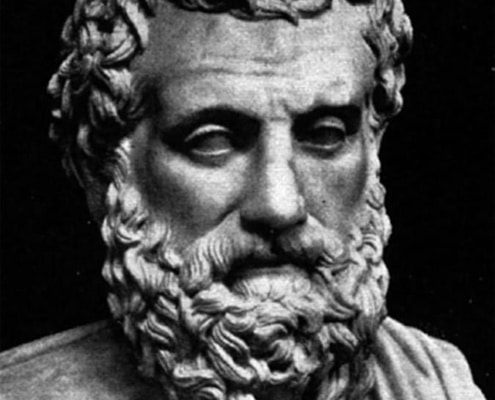Sophocles (496-406 BCE)
Sophocles, an ancient Greek dramatist, wrote plays that have stood as a model for tragic dramas, both by Greek and Roman writers and into the modern age, hugely influencing the playwrights of the golden age of Elizabethan drama in England, as well as modern dramatists.
He dramatically changed the tragic form by adding a third actor, thereby eroding the role of the chorus in the presentation of the plot. He was the first playwright to present the fully realized psychological characters that are the central feature of Romantic and modern tragedy.
We know almost all there is to know about the life of Sophocles – much more than we know about the more modern Elizabethan playwrights. That is because he was not an anonymous writer but also a public figure who served on the Board of Generals, a committee that controlled the civil and military affairs of Athens, and also he was at one point director of the Treasury.
His immortality is due to his writing, however. He was deeply immersed in the theatre, and he transformed drama into something like it exists today. As he grew up he was already famous as a child and youth in Athens for his beauty and stunning intelligence. His family was wealthy so he enjoyed the privileges available to favoured Greeks. He took up acting and, like another actor, William Shakespeare, began writing plays. His first play won the playwriting competition at the Dionysia theatre festival, beating Aeschylus himself.

Portrait of Sophocles
Continuing to write plays he wrote more than 120. Every play he entered in competitions won either first or second prize. Unfortunately only seven of Sophocles’ plays have come down to us, but those seven have been recognised as being head and shoulders above the very rich collection of Greek dramas. One of the plays, Oedipus the King is not only his most famous but also arguably the greatest Greek drama. Electra is just about equally famous. Two of his plays, Antigone and The Women of Trachis are famous for having fully rounded female characters in the way that appeals to the modern taste where psychological drama tops the bill in popular theatre.
Read biographies of all of the 30 greatest writers ever >>



